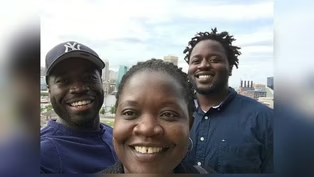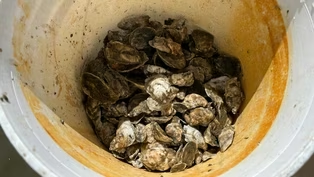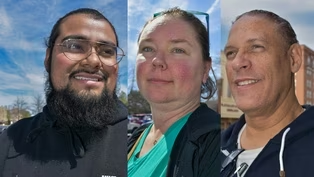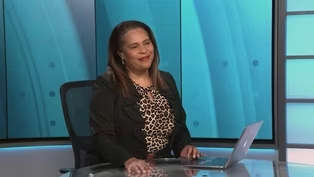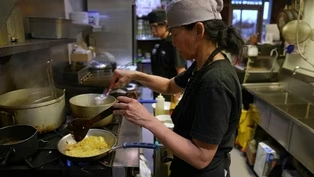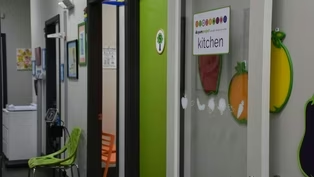VPM News Focal Point
Connecting with ancient traditions through seeds
Clip: Season 2 Episode 5 | 7m 59sVideo has Closed Captions
Native Americans ensure the survival of heirloom seeds that connect them with the past.
A network of Native Americans are working together to ensure the survival of heirloom seeds that connect them with ancestral ways and traditions.
Problems playing video? | Closed Captioning Feedback
Problems playing video? | Closed Captioning Feedback
VPM News Focal Point is a local public television program presented by VPM
The Estate of Mrs. Ann Lee Saunders Brown
VPM News Focal Point
Connecting with ancient traditions through seeds
Clip: Season 2 Episode 5 | 7m 59sVideo has Closed Captions
A network of Native Americans are working together to ensure the survival of heirloom seeds that connect them with ancestral ways and traditions.
Problems playing video? | Closed Captioning Feedback
How to Watch VPM News Focal Point
VPM News Focal Point is available to stream on pbs.org and the free PBS App, available on iPhone, Apple TV, Android TV, Android smartphones, Amazon Fire TV, Amazon Fire Tablet, Roku, Samsung Smart TV, and Vizio.
Providing Support for PBS.org
Learn Moreabout PBS online sponsorshipADRIENNE MCGIBBON: It's mid-March and not quite warm enough for planting in Virginia's Blue Ridge Mountains.
But for seed keeper, Desirée Shelly Flores, between her three kids, graduate school and her garden, there's never a free moment.
DESIR ÉE SHELLEY FLORES: Gardening is really a year-round practice.
ADRIENNE MCGIBBON: She started growing these tomatoes, peppers, and eggplants back in January.
(water spraying) Desirée is a native of Baltimore, but as her family grew they decided to move to Catawba, a town outside of Roanoke.
DESIR ÉE SHELLEY FLORES In 2017, my husband and I moved here.
A large portion of that was to be closer to my tribal community, which is the Monacan Indian Nation and to be within what we call Yésa sometimes also called Tutelo-Saponi ancestral homelands.
So I wanted to be sort of in that area, be able to introduce my kids to that part of their ancestry.
ADRIENNE MCGIBBON: Desirée's been gardening since she was a kid and even helped start an Indigenous garden at the University of Maryland where she was a student.
DESIR ÉE SHELLEY FLORES: I think it was at that point I realized there's so much I don't know about our seeds and about our history.
So after graduating, I began to get more involved with Indigenous traditional lifeways and foodways.
ADRIENNE MCGIBBON: Eventually Desirée connected with the Alliance of Native Seed Keepers, a network of Indigenous people committed to cultivating ancestral seeds.
Members of the Alliance plant and grow them, then share them to ensure the Indigenous seeds survive.
Alliance members are mainly based in the mid-Atlantic region, but spread up into the Northeast and even into Canada.
DESIR ÉE SHELLEY FLORES: A lot of these seeds were being housed with seed companies, but not within the Indigenous communities.
People will still talk about Tutelo corn 'cause that's what they've called it is Tutelo strawberry corn.
They say, "Well, the people who used to grow this corn are extinct."
And that they're seed keeping it for them in their memory, sort of romanticizing the memory of Indigenous people and that does a lot of harm to our communities.
ADRIENNE MCGIBBON: Victoria Ferguson, a Monacan elder, grew up on the West Virginia side of the Blue Ridge and now lives in Roanoke.
She learned how to keep seeds from her mother.
VICTORIA FERGUSON: Years ago, my mother started putting them in envelopes and just writing the names on the seeds and that's why you'll see some of the envelopes here because it's something that she used to always do.
ADRIENNE MCGIBBON: Victoria has been keeping seeds for decades.
In her collection today, she prizes her batch of Tutelo strawberry corn, which she's been growing for six years.
VICTORIA FERGUSON: I really, really like the color of them and how they look when they're growing.
ADRIENNE MCGIBBON: She says the seeds are so precious that she's never even tasted the corn because once eaten, the seeds are gone.
VICTORIA FERGUSON: And so, I save almost any seed I could possibly save at this point in time.
But my father used to always say, "It's better to have and not need than to need and not have."
ADRIENNE MCGIBBON: Victoria recalls walks in the woods with her father and siblings.
VICTORIA FERGUSON: And as he's walking through, he would identify different plants.
He would tell them the use of it.
He taught them how to mark their trails so they wouldn't get lost and they can get back home.
ADRIENNE MCGIBBON: Following generations of racism, segregation, and land loss endured by native people.
Victoria laments the loss of connection to tribal places, but she still cherishes what her parents taught her about living in harmony with nature and still keeps the traditions alive.
VICTORIA FERGUSON: My father made sure we built these little ridges to put our seeds in and how he stepped off the garden and he had this stick that he used to put a hole in the ground where the corn seeds would grow.
And so, just being involved with that from the time that I was five so I still plant my corn and beans together like I was taught from my early age.
ADRIENNE MCGIBBON: Victoria taught her own children and now teaches students at Virginia Tech the same method she learned as a young girl.
She started an Indigenous garden on campus in 2014.
From one Virginia College campus to another, researchers at William & Mary are using high-tech tools to enhance ancient knowledge and build food sovereignty.
TROY WIIPONGWII: Food sovereignty is the concept that a community would be completely self-sufficient on their own, being able to grow their own food, commodities.
Whether that be livestock, crops, aquatic animals.
Being able to support their community and the growth of their community sustainably.
ADRIENNE MCGIBBON: Troy Wiipongwii is part of a group designing an AI powered computer program for Virginia's tribes.
The program connects ancient and modern agricultural knowledge to predict the best place for crops to grow, how much that location will yield, and the cost of production.
TROY WIIPONGWII: And we're going out into the communities to talk about what types of foods they're currently eating and what do they think are traditional foods and what would they like to be seen grown on tribal lands if they were to engage in a food sovereignty project is getting a conversation going that's incredibly important for this resurgence of Indigenous food.
I see technology as an enhancement of what's happened in the past with the ability to do real-time kind of evaluation to ensure that we can continue to move forward, either in the way that our ancestors have done it or in a way that is set for the modern age.
ADRIENNE MCGIBBON: Just down the road from William & Mary, the focus turns from sustenance to the sacred.
CHRIS CUSTALOW: Tobacco's used in our community in a way it's more ceremonial and seen more as medicinal.
ADRIENNE MCGIBBON: Historian Chris Custalow, who is Cherokee, shares his knowledge about American Indian life in the 18th century at Colonial Williamsburg.
CHRIS CUSTALOW: These are the tobacco seed pods.
Now, you can fit about 50,000 tobacco seeds within one teaspoon.
ADRIENNE MCGIBBON: Chris was faced with a challenge all Seed Keepers deal with.
In order to cultivate the seeds you have to plant them, but there's always the risk that what you plant won't survive.
He started with just 100 tobacco seeds and his efforts to save them have been a success.
CHRIS CUSTALOW: So, I was able to provide tobacco to not only my own community directly, but the larger Native community in Virginia.
ADRIENNE MCGIBBON: Chris is growing the Indigenous tobacco at Colonial Williamsburg to teach visitors about its historical and cultural significance.
CHRIS CUSTALOW: It's typically taboo to purchase something like that.
So you'd want to grow it yourself, harvest it yourself, or be gifted it.
And so, it's just become a responsibility of mine to provide that to the community.
ADRIENNE MCGIBBON: Chris sees these renewed efforts to cultivate seeds as a kind of activism.
CHRIS CUSTALOW: We have had the longest interaction of colonization here in Virginia and so those tribes here in the local area have stood the test of time and have been here on reservations for the longest period of time as well.
And so, being able to provide these seeds and cultivate these seeds is that form of resistance to all the things that we've lost throughout time to colonization.
ADRIENNE MCGIBBON: Victoria and Desirée support all efforts, both technological and natural, to reconnect communities and revive ancestral practices.
DESIR ÉE SHELLEY FLORES: Fight like you live here.
You're going to fight to protect that land and part of that is taking care of it because you want to take care of it for the next generation, for those who come after you.
Activists say Marcus Alert System isn’t doing enough
Video has Closed Captions
Clip: S2 Ep5 | 5m 8s | Advocates say the Marcus Alert System isn't protecting people with mental health issues. (5m 8s)
Video has Closed Captions
Clip: S2 Ep5 | 3m | Lynnhaven oysters are known for their size and saltiness. (3m)
People of Virginia | Food and Culture
Video has Closed Captions
Clip: S2 Ep5 | 1m | We talked with people of Virginia about food, we found most have an emotional response. (1m)
Soul food is closely tied to Black cultural identity
Video has Closed Captions
Clip: S2 Ep5 | 8m 21s | Byron Hurt explores Soul Food and its complicated connections to the Black community. (8m 21s)
Taste of Home: Immigrant-owned restaurants in Harrisonburg
Video has Closed Captions
Clip: S2 Ep5 | 4m 14s | Harrisonburg restaurant owners from Kurdistan, Mexico and Malaysia share their stories. (4m 14s)
This doctor says food is, indeed, medicine
Video has Closed Captions
Clip: S2 Ep5 | 1m 39s | For centuries, there have been cultures that treat diet as medicinal. (1m 39s)
Providing Support for PBS.org
Learn Moreabout PBS online sponsorship
- News and Public Affairs

Top journalists deliver compelling original analysis of the hour's headlines.

- News and Public Affairs

FRONTLINE is investigative journalism that questions, explains and changes our world.












Support for PBS provided by:
VPM News Focal Point is a local public television program presented by VPM
The Estate of Mrs. Ann Lee Saunders Brown
